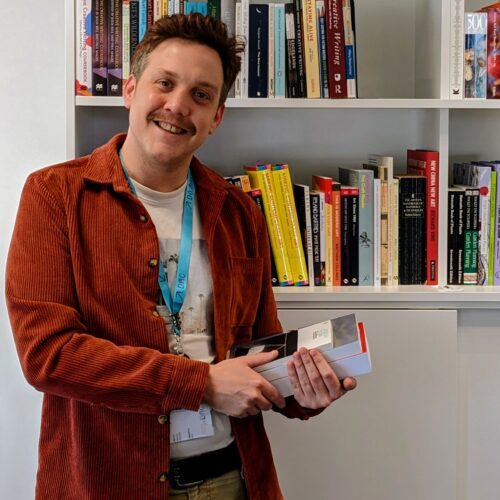
WE are OCA
… students are neither disciplinary nor pedagogical experts. Rather, their experience and expertise typically is in being a student – something that many faculty have not been for many years. They understand where they and their peers are coming from and, often, where they think they are going.¹
OCASA is the OCA’s student association. Over the last year it has seen a lot of changes, some owing to unforeseen events. We believe that this is a good opportunity to give the association a ‘health check’ and figure out what it means to be a student association in distance learning. OCASA president, Bernadette Raho-Jeavons and OCA Academic Development Officer, Joanne Mulvihill-Allen have worked together, with input from the current reps, to shape how this might look. In this post we’re going to look at the rationale for one proposed change – student representation.
At present the association is made up of a President and subject specific reps. As the number of degree areas grow so will the need for representation. OCA has course specific unit leaders in place and Programme Leaders for each degree area. The forums and forthcoming Virtual Learning Environment (VLE) will provide a space for any course specific queries to be addressed. With this in mind we have the scope to be ambitious and align our student representatives with OCA’s Academic Strategy and the relevant members of OCA HQ. This will allow students to be agents for change within the Open College of the Arts and gives our Student Representatives the chance to focus on more value led objectives that are meaningful to all students and their learning journeys and to build a community of change.
We propose the following representative roles to be advertised and filled for the forthcoming academic year 20/21. There is the possibility to amalgamate some of these roles together.
Lead Rep
The Lead Rep will act as the main, but not exclusive, point of contact with OCA. They will attend relative meetings either online or in person with OCA and they will lead on organising Student Association meetings.
Deputy Lead Rep
The Deputy Lead Rep will support the Lead Rep and be available to take their place at any relevant meeting should the lead be unable to attend. The Deputy Rep role can be in conjunction with another Rep role.
Wellbeing Rep
The Wellbeing Rep will promote positive wellbeing and mental health. They will use the #WeAreOCA blog to share tips and articles.
Accessibility Rep
The Accessibility Rep will advocate for access and work with the Learner Support team at OCA to ensure guidance and any reasonable adjustments are fit for purpose.
Social & Communications Rep
The Social & Communications Rep will work with the Lead Rep and OCA Associate to coordinate communications for informal and formal meetings. They will maintain a presence on the relevant area of the Discuss forum and social media. They will help administer study events working with the Student Association Secretary.
Diversity/Inclusivity Rep
The Diversity and Inclusivity Rep will help ensure there is parity of opportunity for all students. They will help raise awareness using the #WeareOCA blog space and consider how to decolonise and diversify the curriculum in a culturally sensitive way.
Environment & Sustainability Rep
The Environment and Sustainability Rep will work with OCA and students to promote better working practices and glean information on how we can make a difference in the current climate crisis. They will use the #WeAreOCA blog space as a place to vocalise concerns and opportunities.
Technology/IT Rep
The Technology and IT Rep will work closely with students and OCA to ensure the technology used is fit for purpose. They are not there to act as tech support rather to advocate best practices and student friendly IT. They could work with the TEL team to help coordinate student testing of new technological initiatives.
International Rep
The International Rep will represent students outside of the UK and ensure their voices are heard.
OCA Studies Rep
The OCA Studies Rep will help disseminate changes and developments regarding courses and studying with OCA. They will help point students in the direction of help for course specific queries either to OCA HQ or the relevant programme leader/unit leader. They will work with the Social & Communications Rep to ensure students are aware of changes for example timeframes, policies and the removal or addition of units. It may be relevant to have more than one student in this role at any given time.
Secretary
The Student Association Secretary is a member of OCA HQ who will work closely with Reps as the point of contact between the Student Association and OCA. They will help coordinate study events and #WeAreOCA content. They will attend Student Association meetings to advise as needed. They will help promote a student led approach to OCA decision making. As the proposed roles are more holistic in nature, it is vital that expectations are managed and students are not seen as experts in any given area, the Student Association Secretary role will be essential here.
The Open College of the Arts describes its vision to be at the forefront of student-led creative arts education through open, enhanced, & supported distance learning, for an evolving society.
In order to be truly student led we must work together in a mutually beneficial and collaborative way. Through a reciprocal relationship students will be able to have more autonomy over their own learning experience, allowing OCA to become more democratic, ethical and engaging. As an alternative learning provider we mean to be alternative not as a second best alternative, but to be different. In seeing our students as partners and listening to our students’ voices, we can move from a transactional model where students are informed and consulted, to being co-creators in learning and teaching.
We recognise the diversity of our student body, and the fluid nature of all our identities, characteristics that come with being an adult learner and those that come with studying via distance and online. Parents, carers, sons and daughters, doctors, scientists, mums and lawyers. Those confined to bed, a cell or generally unwell. Those starting their career or looking for a change, those pursuing their passion and adding skills to their range. As a global educational community that defies borders, we must work together to nurture principles of trust, respect, tolerance and wellbeing.
A feedback form was distributed via the student forums and E-bulletin for OCA student responses. There’s still time to have your say visit https://discuss.oca-student.com/t/your-views-on-open-college-arts-student-association/11292?u=joannemulvihill-alle
Following formal approval the full proposal will be shared amongst the OCA community to be shaped by OCA students. We hope the new Student Association roles will capture your interest and you’ll consider being a rep. Be the change you want to see.
1, Healey, M. Flint, A. & Harrington, K. (2014) Engagement through partnership: students as partners in learning and teaching in higher education. The Higher Education Academy. Accessed online at https://s3.eu-west-2.amazonaws.com/assets.creode.advancehe-document-manager/documents/hea/private/resources/engagement_through_partnership_1568036621.pdf
|
|







I was about to write to my programme leader about what I consider to be very poor channels of communication indeed between the oca and students. A case in point is the recent poor communication on changes to regulations – student forums have been awash with anxiety about this. A second example is students deciding to leave because of no tutor communication and feeling unsupported – I heard from 3 in the last weeks who have made this decision . I personally have only had 1 request from my student rep for a view on anything in the last 4 and a half years at oca. I have no idea how my student rep was appt, how they communicate with oca or how they see their role – I don’t know who they are. So I am extremely pleased that this poor state of affairs will hopefully improve. Cutting the oca weekly bulletin to once a month is another example of cutting back on communication to students who already feel isolated. Let’s hope this can be remedied too. I understand that student completion rates are dire – this doesn’t surprise me in the least when we work in such isolation. Finally as many of us are mature students we are experts in many things. The opening quite does not reflect this and I find it a little patronising. I am not an expert in art – but I am an expert in pedagogy and feedback for learning which I research and publish on. I’d like to suggest that oca recognise the expertise if their student body, stop treating us like immature adolescents and actually use our expertise by consulting us.
Thank you for responding Susan. I completely agree that we need to acknowledge the intersectional qualities of our students. You are adult learners and should be treated as such and your expertise and experience is rich and varied. I read recently; “Michael Young (OCA’s founder) was a profound believer in the transformative power of education and was always deeply concerned with issues of inequality and exclusion. He believed in radical new teaching principles and validated the idea that students themselves should be involved as active participants, not passive recipients of education. That their life experiences outside the university – in the workplace and in the home – shouldn’t be seen as irrelevant or a distraction, but a positive asset.” (Horrocks, 2015) My hope is that this alignment between a new look student association and OCA will bring Young’s vision back to the forefront of what we do.
Communication is an issue, and a group has been established to try and tackle some of the issues and advise on best practice so we can do better. We have to do better.
This is timely, and I’m pleased but not surprised to see Susan Askew here ahead of me; we have similar backgrounds and concerns. Mine at the moment focus particularly on the methodology employed to gather and analyse data used in the changes to the time allowed to complete modules. My concern comes from questions I put to the person tasked with doing this and the responses, or lack of them, lead me to believe the process was statistically and methodologically flawed. I was trained in experimental design and statistics as an undergraduate – two hours a week for three years so not inconsiderable – and subsequently used those skills in three research degrees. What that taught me is that I’m not an expert and that wherever findings will impact on the people whose data have been used, an expert should be consulted. To date I’ve had no assurance that this happened and share concerns with at least one academic lead that this may lead to disadvantage for students of materials-intensive courses. The outcome of that discussion was, among other things, for me to contact OCASA about how to address this, hence this post. You can see the dialogue I’ve had about this here https://discuss.oca-student.com/t/academic-regulatory-framework-changes-and-new-policies/11000/106
Thank you for responding, I think it will be imperative to have a student association who is involved in making and delivering decisions that affect students. I think the language and mode of delivery for change needs further consideration as the nature of learning through distance is that questions and answers can be slow and this can cause undue stress. I have not been involved in the recent changes and how they were communicated but I am aware of some of the responses, there is a lesson to be learned and as mentioned in the response above a group has now been established to address our pitfalls around communication and hopefully a new look association will also bring the students voice to the fore and create a space for students to take questions and concerns.
Joanne, I’m wondering if this is a response to my comment as it seems more related to Susan Askew’s. Is there a route whereby I can talk to OCASA about the issues relating to the methodology of data collection and analysis that has influenced the prescribed timescales for completion? This needs to happen quite quickly.
Apologies, you can email ocasa@oca.ac.uk to reach all members of the association. You can contact Bernadette who is acting president via her OCA email address, I won’t paste it in this public space but you can find it on the discuss forum here – https://discuss.oca-student.com/t/your-views-on-open-college-arts-student-association/11292?u=joannemulvihill-alle
Ok, thanks.
Joanne
Thanks for this post. I welcome a new way of thinking about the role of OCASA. I have a couple of key questions / observations. Firstly, whilst I applaud the ambition for co-creation I wonder what had happened to student representation? I don’t mean the new roles but rather the autonomy of the student representative body to shape its own structure and democratic approach to representation. It’s a bit unusual for the staff of a college or university to be leading on the change in student democracy. rather than the student body itself. I’m sure you will provide assurance that these ideas came from the reps but the voice of OCASA seems silent on this matter. I’m wondering about the future of the students representative body’s independence.? I appreciate that the OCA May not have the funds for having sabbatical officers but it seems to me that a key problem for our reps ( therefore for the student body) is having the time to actually carry out their functions, as volunteers and studying and, in many cases , working full time. Compare that with other institutions where 2/3 students will take a sabbatical, paid year to support and represent the student body, New roles for reps may be better aligned to the staffing structure of OCA but it won’t solve that problem. I do however hope that the proposed change which I’m sure are the result of much work, will generate interest among students and help move us forward.
Morning Annette, thank you for commenting. I have been working closely with OCASA for a few years to help support and offer an OCA voice on some things, last year I worked with tutor Jayne Taylor on a project around student engagement which has resulted in more regional group activity and degree specific groupwork amongst other things. We talked a lot with the association and really wanted to see it become a driving force for change but unfortunately owing to personal circumstances, the wheels came loose. As a unique learning provider the thinking was that we could do something different with our association and really use the expertise of our students to inform what we do but also try to alleviate some of the menial tasks a bricks and mortar association might do that don’t quite sit right within our set up, so I worked with Bernadette since around August with input from the other remaining reps to pull together a proposal to take to the Board of Trustees this week, so this extract is written in my voice and it is a bit formal because of that. Once we have some feedback I will be taking a back seat and Bernadette and existing reps will lead the change, there is a sense of urgency to get something up and running but it has to be meaningful for all stakeholders. If that role of Secretary is approved as a new part time paid role, it could be taken up by an alumni perhaps and it will be someone who is solely advocating the student voice. I absolutely champion the diversity of our students and the fact you are adults and should be treated as such but I am aware I also have another role to do within the organisation. This is a starting point and as you say we need to move forward, I think you have to be in something to enact change so I suppose I want to position students closely to introduce a tilt in how we operate.